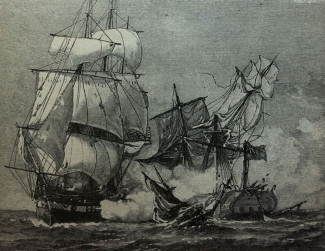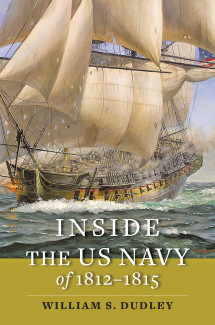Johns Hopkins UniversityEst. 1876
America’s First Research University
Now Browsing:
Writing “Inside the US Navy of 1812–1815”
The anticipation of anniversaries of significant events have often stimulated authors to focus attention on the event or personalities to be celebrated or commemorated. Usually the sequence of these anniversaries occurs every fifty years or so after the initial occurrence. To be a part of the event, the author needs to anticipate by several years the amount of research that will be required to contribute a timely piece of work that would make a difference. At the same time, one must ask “what could I contribute that has not already been written?” To answer that question, there are several possible answers: discovery of new evidence, development of a new interpretation, or simply, or the challenge of writing a better, more comprehensive account of the event than has been done in the past. In my case, it was the bicentennial of the War of 1812. Over time, this two and one-half year conflict between the United States and Great Britain was an almost forgotten, often derided historical event. But between 1960 and 2012, there has been a revival of War of 1812 scholarship that has grown until a new generation of American, Canadian, and even British historians had awakened to the need for new approaches to a venerable though neglected topic.
My book, Inside the US Navy of 1812–1815, comprises a history of the inner workings of the US Navy Department during the War of 1812-1815. Underlying the naval battles were the difficulties of supporting the war, its administration, finance, supply, recruitment, transport, medical support, and shipbuilding. Since many earlier accounts have depended on the “sea battles and commanders” approach without delving deeply into other elements that make for success or failure in naval warfare, my approach is to look at the reverse of the coin. It was especially critical for the miniscule US Navy, as it faced the war-hardened Royal Navy, to create, find, and develop the resources for war that it lacked initially. For the United States, this was an existential crisis. To a great extent it was less a matter of winning, but of surviving and then outlasting a better prepared and more experienced enemy. In this book, while not neglecting operations, I present the administration and logistics of the war in relation to fleet actions on the lakes and selected ship actions on the oceans.

Using the official correspondence of three successive secretaries of the navy, Paul Hamilton, William Jones, and Benjamin Crowninshield, I bring out the personalities of each as they dealt with the difficulties of managing a department which was short of staff, funding, and professional advice. Equally important were the relationships each secretary created with his senior ship commanders since the department had no equivalent to a chief of staff or chief of naval operations. I relied on twenty-five years as a documentary editor with experience in primary source research in the national archives of the United States, Canada, and the United Kingdom, as well as public and private libraries. This was supplemented with extensive readings of the principal secondary sources on the war and interactions with colleagues and scholars of many years’ standing. The significance of this work is contained in its multi-archival research base and the documentation which reveal the underpinnings of the naval war and bring to light unfamiliar details to show how the US Navy operated and contributed strategic value to bringing the War of 1812 to an honorable conclusion.
Order Inside the US Navy of 1812–1815 at the following link: https://jhupbooks.press.jhu.edu/title/inside-us-navy-1812%E2%80%931815
William S. Dudley, Ph.D. was the director of the Naval Historical Center from 1995 to 2004. The original editor of The Naval War of 1812: A Documentary History, he is the author of Inside the US Navy of 1812–1815, Maritime Maryland: A History, and the coauthor of The Naval War of 1812: America's Second War of Independence.

My book, Inside the US Navy of 1812–1815, comprises a history of the inner workings of the US Navy Department during the War of 1812-1815. Underlying the naval battles were the difficulties of supporting the war, its administration, finance, supply, recruitment, transport, medical support, and shipbuilding. Since many earlier accounts have depended on the “sea battles and commanders” approach without delving deeply into other elements that make for success or failure in naval warfare, my approach is to look at the reverse of the coin. It was especially critical for the miniscule US Navy, as it faced the war-hardened Royal Navy, to create, find, and develop the resources for war that it lacked initially. For the United States, this was an existential crisis. To a great extent it was less a matter of winning, but of surviving and then outlasting a better prepared and more experienced enemy. In this book, while not neglecting operations, I present the administration and logistics of the war in relation to fleet actions on the lakes and selected ship actions on the oceans.
Using the official correspondence of three successive secretaries of the navy, Paul Hamilton, William Jones, and Benjamin Crowninshield, I bring out the personalities of each as they dealt with the difficulties of managing a department which was short of staff, funding, and professional advice. Equally important were the relationships each secretary created with his senior ship commanders since the department had no equivalent to a chief of staff or chief of naval operations. I relied on twenty-five years as a documentary editor with experience in primary source research in the national archives of the United States, Canada, and the United Kingdom, as well as public and private libraries. This was supplemented with extensive readings of the principal secondary sources on the war and interactions with colleagues and scholars of many years’ standing. The significance of this work is contained in its multi-archival research base and the documentation which reveal the underpinnings of the naval war and bring to light unfamiliar details to show how the US Navy operated and contributed strategic value to bringing the War of 1812 to an honorable conclusion.
Order Inside the US Navy of 1812–1815 at the following link: https://jhupbooks.press.jhu.edu/title/inside-us-navy-1812%E2%80%931815
William S. Dudley, Ph.D. was the director of the Naval Historical Center from 1995 to 2004. The original editor of The Naval War of 1812: A Documentary History, he is the author of Inside the US Navy of 1812–1815, Maritime Maryland: A History, and the coauthor of The Naval War of 1812: America's Second War of Independence.

Login to View & Leave Comments
Login to View & Leave Comments


